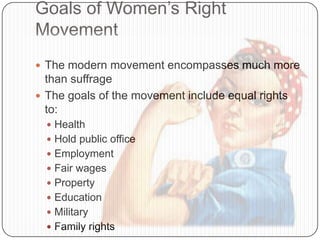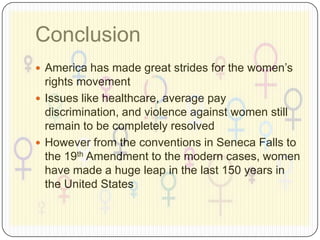Womens Rights
- 2. Importance of Women’s Rights Equality between the sexes Females should be able to lead lives without feeling “less than” Equal access to education, health, and employment for both sexes
- 3. Origins Women’s rights have been a global issue since ancient times China: foot binding Rome: could not vote, hold office, serve in military Athens: not even considered citizens Religious books i.e. Bible, Quran, support inequality Even in the Enlightenment, philosophers did not support equal rights for genders “When she tries to usurp our rights, she is our inferior.” – Jean Jacques Rousseau
- 4. Origins in the U.S. The first women’s rights convention was held in Seneca Falls, NY in 1848 Primary goal was the right to vote December 10, 1869, Wyoming passed the first women’s suffrage law The 19th Amendment was added to the Constitution, granting women the right to vote Since then, the movement has progressed to fight for much more than the right to vote
- 5. Goals of Women’s Right Movement The modern movement encompasses much more than suffrage The goals of the movement include equal rights to: Health Hold public office Employment Fair wages Property Education Military Family rights
- 6. Reed v. Reed 1971 Sally and Cecil Reed were a separated couple who both petitioned to be the administrator for their son’s estate Cecil was originally named administrator for the sole reason of being a male Decision was overturned by Supreme Court in this case “To give a mandatory preference to members of either sex… is to make the… legislative choice forbidden by the Equal Protection Clause”-Chief Justice Burger This was a landmark case because it was the first time the the US Supreme Court ruled a discriminating law against women was unconstitutional
- 7. Cleveland Board of Education v. LaFleur LaFleur was forced to take an unpaid maternity leave after her pregnancy in 1974 and she contested this Her case made it to the Supreme Court in 1975 The Supreme Court decided it was unlawful to require women to take unpaid maternity leaves after the first trimester Regarding the due process, health, and employment issues, this case was issued in 1975 in favor of LaFleur Justice Stewart commented, “By acting to penalize the pregnant teacher for deciding to bear
- 8. Meritor Savings Bank v. Vinson Mechelle Vinson sued the bank and specifically, the vice president after being fired Vinson said the sexual harassment she endured should be declared unlawful discrimination It was decided “unlawful discrimination” would not just be limited to tangible effects The purpose of the Civil Rights Act of 1964 was to change “the entire spectrum of disparate treatment” of men and women alike This case was a big victory for women who had suffered in the workplace due to sexual harassment
- 9. Impact Due to many of the landmark cases in the U.S. many countries are starting to follow suit Women’s rights are at the top of El Salvador’s agenda for 2014 More women are entering the global political arena Women’s average wages have increased and the pay gap between men and women has narrowed significantly However some do not fully support all aspects of the movement Believe pay difference is not due to discrimination, but choices in occupations Women should be included in draft
- 10. Conclusion America has made great strides for the women’s rights movement Issues like healthcare, average pay discrimination, and violence against women still remain to be completely resolved However from the conventions in Seneca Falls to the 19th Amendment to the modern cases, women have made a huge leap in the last 150 years in the United States










